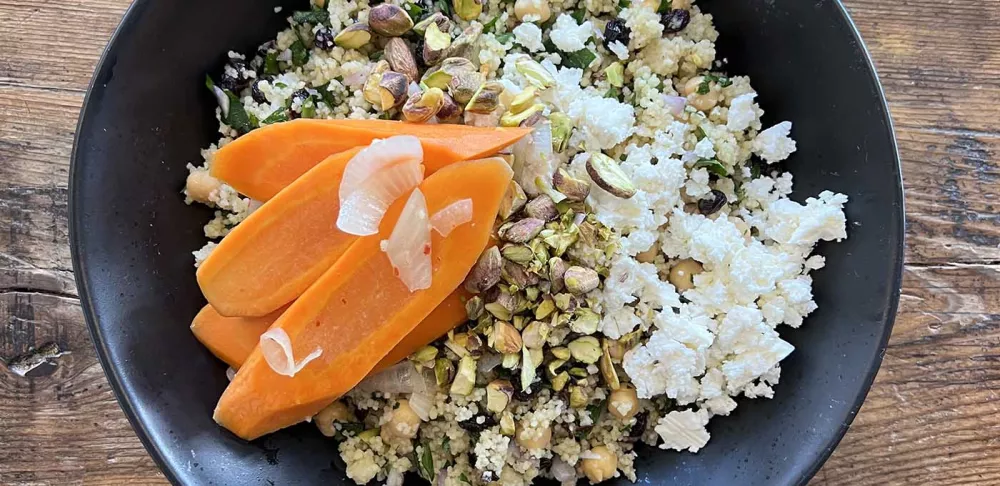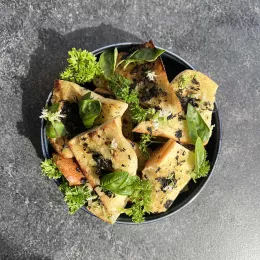Aromatics such as fresh or dried herbs, spices, hot peppers and any members of the allium family are often included when fermenting produce. It is quite sorcerous how pronounced the flavors of the accompanying aromatics come through during the lacto-fermentation process.
The featured produce is infused to a profound degree that is frequently challenging to achieve without any heat application. The resulting vegetable is not only flavorful but also perfectly seasoned and retains a varying level of crunch. These attributes make fermented vegetables the perfect addition to your favorite grain bowl.
The benefits of incorporating a fermented component into a grain bowl can be plentiful. The benefits of incorporating a fermented component into a grain bowl can be plentiful. For example, herbs added to the grain bowl will not face the fate of oxidation and grains will become less soggy because there is little need for a vinaigrette for added flavor. Less moisture overall also extends the shelf life of the bowl by a few days.
Good to Know with Chef O:
- The Moroccan-inspired flavor profile for the fermented carrots stems from the addition of cinnamon sticks, onion, harissa paste, garlic cloves and cumin seeds.
- This grain bowl comes together relatively quickly because the couscous doesn’t have to be cooked. It is ready in a matter of minutes as it only needs to be rehydrated with boiling water and then covered to allow it to steam.
- Adding currants to the couscous while it is rehydrating adds a natural sweetness to the dish.
- The fermented carrots serve as the bright acidic component of this grain bowl so no additional vinegar or lemon juice is needed to balance out the flavor profile.
- Try chopping the fermented carrots into smaller pieces and incorporating them directly into the couscous salad mixture to create the perfect bite.

Ingredients
For the Fermented Moroccan Carrots:
Yield: 1 half-gallon jar
- 4 large carrots, peeled and cut into coins
- 1 white onion, sliced
- 4 garlic cloves, cut into quarters
- 6 cinnamon sticks
- 2 tablespoons harissa paste
- 2 teaspoons cumin seeds
- 2 tablespoons sea salt
- 3 cups water, or enough to cover
For the Grain Bowl & Assembly:
- 1 cup couscous
- 1/2 cup currants
- 1 cup cooked chickpeas
- 1 small bunch parsley, chopped
- 1 shallot, finely chopped
- 1/4 cup olive oil
- 1 teaspoon sea salt
- 1 cup fermented Moroccan carrots
- 1 cup crumbled feta
- 1/2 cup pistachios, toasted
Directions
For the Fermented Moroccan Carrots:
- Add cut carrots, onion and garlic cloves into a large bowl.
- Massage with cinnamon sticks, harissa, cumin seeds and sea salt.
- Transfer and pack mixture into 1/2-gallon sterilized glass jar along with any residual liquid.
- Pour enough water to reach the bottom rim of the jar.
- Use a fermentation weight to weigh down produce.
- Fasten jar with airlock lid.
- Ferment at room temperature for one week.
- Refrigerate for extended storage.
For the Grain Bowl & Assembly:
- Bring 1 1/4 cups water to a boil in a small pan.
- Turn off heat and stir in couscous and currants.
- Cover and steam for 10 minutes.
- Fluff mixture with fork and transfer to a medium bowl.
- Stir in chickpeas, parsley, shallots, olive oil and sea salt.
- Top with Moroccan carrots, crumbled feta and toasted pistachios.
More fermented recipes from Chef Olivia:






